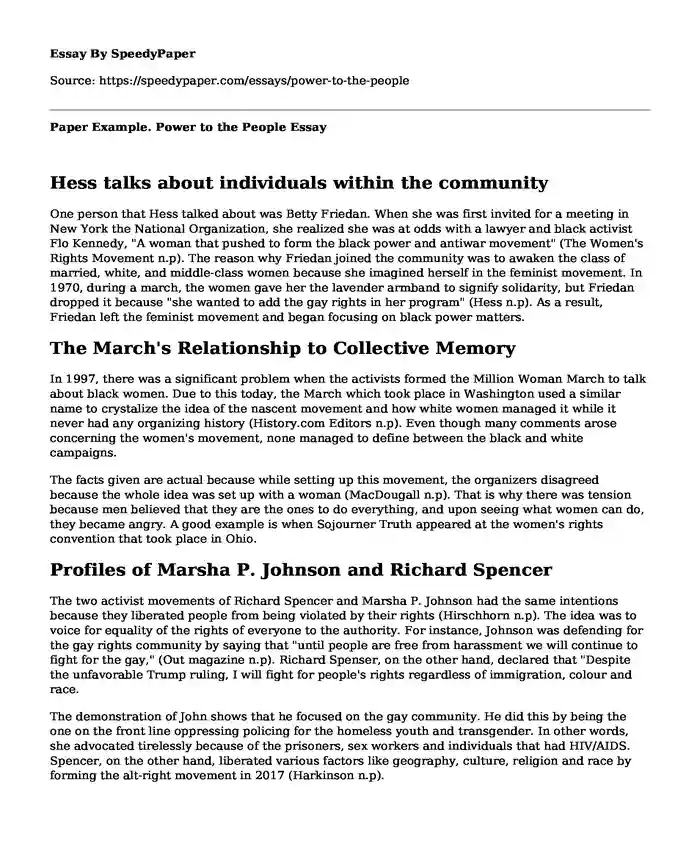
| Type of paper: | Essay |
| Categories: | Women Gender Discrimination Human sexuality |
| Pages: | 3 |
| Wordcount: | 757 words |
Hess talks about individuals within the community
One person that Hess talked about was Betty Friedan. When she was first invited for a meeting in New York the National Organization, she realized she was at odds with a lawyer and black activist Flo Kennedy, "A woman that pushed to form the black power and antiwar movement" (The Women's Rights Movement n.p). The reason why Friedan joined the community was to awaken the class of married, white, and middle-class women because she imagined herself in the feminist movement. In 1970, during a march, the women gave her the lavender armband to signify solidarity, but Friedan dropped it because "she wanted to add the gay rights in her program" (Hess n.p). As a result, Friedan left the feminist movement and began focusing on black power matters.
The March's Relationship to Collective Memory
In 1997, there was a significant problem when the activists formed the Million Woman March to talk about black women. Due to this today, the March which took place in Washington used a similar name to crystalize the idea of the nascent movement and how white women managed it while it never had any organizing history (History.com Editors n.p). Even though many comments arose concerning the women's movement, none managed to define between the black and white campaigns.
The facts given are actual because while setting up this movement, the organizers disagreed because the whole idea was set up with a woman (MacDougall n.p). That is why there was tension because men believed that they are the ones to do everything, and upon seeing what women can do, they became angry. A good example is when Sojourner Truth appeared at the women's rights convention that took place in Ohio.
Profiles of Marsha P. Johnson and Richard Spencer
The two activist movements of Richard Spencer and Marsha P. Johnson had the same intentions because they liberated people from being violated by their rights (Hirschhorn n.p). The idea was to voice for equality of the rights of everyone to the authority. For instance, Johnson was defending for the gay rights community by saying that "until people are free from harassment we will continue to fight for the gay," (Out magazine n.p). Richard Spenser, on the other hand, declared that "Despite the unfavorable Trump ruling, I will fight for people's rights regardless of immigration, colour and race.
The demonstration of John shows that he focused on the gay community. He did this by being the one on the front line oppressing policing for the homeless youth and transgender. In other words, she advocated tirelessly because of the prisoners, sex workers and individuals that had HIV/AIDS. Spencer, on the other hand, liberated various factors like geography, culture, religion and race by forming the alt-right movement in 2017 (Harkinson n.p).
His idea was to ridicule the hobbit states such as Hungary and Poland and the European ethnonationalism by calling for the reconstitution of the European Union to the white racial empire to resemble the Roman Empire (Bravo n.p). Both activists had collective and individual memory changes after some time without videos or photos but with contemporary accounts such as the New York Daily News, The Village Voice and the New York Times. Due to them, many countries have embraced such rights to equalize the citizens and to stop discriminating people that are unable to control how they feel.
Works Cited
Bravo, Tony. 50 years after Stonewall, Is the LGBTQ Community Fully ... 13 June 2019, datebook.sfchronicle.com/entertainment/50-years-after-stonewall-how-has-lgbtq-life-changed
Harkinson, Josh. "Meet the White Nationalist Trying To Ride The Trump Train to Lasting Power." Mother Jones, 23 June 2017, www.motherjones.com/politics/2016/10/richard-spencer-trump-alt-right-white-nationalist/.
Hess, Amanda. "How a Fractious Women's Movement Came to Lead the Left." The New York Times, The New York Times, 7 Feb. 2017, www.nytimes.com/2017/02/07/magazine/how-a-fractious-women's-movement-came-to-lead-the-left.html
History.com Editors. "Women's Suffrage." History.com, A&E Television Networks, 29 Oct. 2009, www.history.com/topics/womens-history/the-fight-for-womens-suffrage.
Hirschhorn, Bernard. "Childs, Richard Spencer (1882-1978), Business Executive and Political Reformer." American National Biography Online, 2000, DOI:10.1093/anb/9780198606697.article.0600810.
MacDougall, John A. "How a Fractious Women's Movement Came to Lead the Left - The New York Times." How a Fractious Women's Movement Came to Lead the Left - The New York Times, 1 Jan. 1970, starting-points.blogspot.com/2017/02/how-fractious-womens-movement-came-to.html.
Out magazine. "Power to the People: Exploring Marsha P. Johnson's Queer Liberation." OUT, 6 Oct. 2017, www.out.com/out-exclusives/2017/8/24/power-people-exploring-marsha-p-johnsons-queer-liberation.
The Women's Rights Movement, 1848-1920: US House of Representatives: History, Art & Archives." The Women's Rights Movement, 1848-1920 | US House of Representatives: History, Art & Archives, history.house.gov/Exhibitions-and-Publications/WIC/Historical-Essays/No-Lady/Womens-Rights/.
Cite this page
Paper Example. Power to the People. (2023, May 01). Retrieved from https://speedypaper.net/essays/power-to-the-people
Request Removal
If you are the original author of this essay and no longer wish to have it published on the SpeedyPaper website, please click below to request its removal:
- Why We Need to Say Goodbye to Work - Free Essay with the Article Analysis
- Personal Essay Sample About Connections
- Free Essay Example on Australian Politics
- Compare and Contrast Essay: Plessy vs. Ferguson and the Brown vs. Board of Education
- Essay Example. Second Language and Identity
- Essay Sample on Types of Regimes
- Free Essay on Characteristics of a Preschool Teacher
Popular categories




